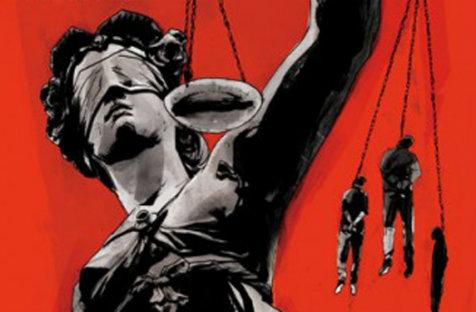Some stories are so compelling that they are worth telling twice, a phenomenon more common in fictional filmmaking than documentaries. With the release of West of Memphis, the unsettling true tale of the trio of teenagers dubbed the ‘West Memphis Three’ receives its fourth screen outing, with Amy Berg’s feature complimenting Joe Berlinger and Bruce Sinofsky’s highly-lauded Paradise Lost series (1996’s Paradise Lost: The Child Murders at Robin Hood Hills, 2000’s Paradise Lost 2: Revelations and 2011’s Paradise Lost 3: Purgatory).
The atrocious miscarriage of justice that sparked such cinematic inquiry began with the brutal murders of three eight-year-old children in Arkansas in 1993. With Satanic ritual the suspected motivation for the murders, local teenagers Damien Echols, Jessie Misskelley Jr. and Jason Baldwin were promptly arrested and sentenced for the crime, their outsider status within the close-knit West Memphis community condemning Echols to death and Miskelley and Baldwin to life imprisonment despite glaring evidence disproving their involvement.
While its predecessors were filmed as the high-profile case unravelled, charting the bias of the prosecution, canvassing theories ignored by the police, and chronicling protestations of innocence, West of Memphis acts as an over-arching summary. The plight of the trio has long since been related in international headlines, and the outcome of their two-decade effort to escape their fates is now well known. Accordingly, the latest documentary has the benefit of hindsight when presenting its overview. The riveting real-life events prove no less enraging and engaging, however the sense of immediacy so present in Berlinger and Sinofsky’s trilogy is absent, and the film’s focus wavers as a consequence.
Comprehensively assembling an array of heartbreaking archival footage alongside intimate present-day interviews, Berg doesn’t shy away from the gritty details, demonstrating the skill with challenging yet captivating material that drove her Academy Award-nominated Deliver Us from Evil. With co-writer Billy McMillin (Project Kashmir), she weaves a fascinating and infuriating narrative about three young men neglected by the US judicial system and left to fester in prison until public outcry – ostensibly led by filmmaker Peter Jackson, his partner Fran Walsh, and a host of other well-known figures – saw sanity finally prevail.
Alas, the emphasis upon celebrity intervention detracts from the detail of the case, tempering the inherent devastation. The testimonials from famous proponents replace insight and analysis, sitting uneasily against evidence mounted against a new suspect, and calling into question the filmmaker’s objectivity. That the film remains spellbinding, shocking and stunning is a testament to the nightmarish injustices perpetrated against the central trio, rather than the feature’s spin on the facts. The tale of Echolls, Misskelley and Baldwin deserves to be told frequently, and with a passion that will inspire people to act; West of Memphis wavers slightly in its methods, but achieves the right outcome.
Rating: 4 stars out of 5
West of Memphis
Director: Amy Berg
USA, 2012, 147 min
In cinemas February 14
Distributor: Sony
Rated MA
Actors:
Director:
Format:
Country:
Release:





